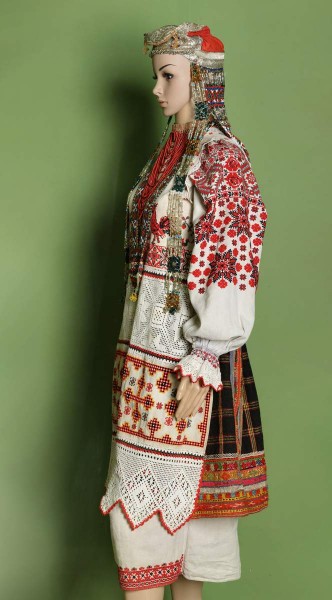Young Woman’s Festive Costume
Pavlovichi Village, Bryansk District, Oryol Gubernia. 1924
- Linen, cotton, red calico, cross stitching, satin stitch embroidery, вязание крючком, weaving, wool, passementerie, spangles, satin stitch embroidery, вязание крючком, kichka, налобник, pozatylen with ryasnas, kokoshnik, beads, braid, stringing, glass beads
- В-8679; В-8678; Т-5728; В-8680 абвг; В-8681; В-8682
Shirt
Flax, cotton, red calico, cross stitching, satin stitch embroidery, crocheting
Ponyova
Wool, weaving
Apron
Flax, cotton, satin stitch embroidery, crocheting
Headdress
Kichka, pozatylen with ryasnas, kokoshnik Гиперссылка на В-8680)
Upon reading a description of the ancient headdress worn by kings and boyars, it is clear that at the start of the 20th century, national headdress retained not only all the terminology relating to the construction of individual components of the dress (ochelye, podniz, ryasy, ryasnas), but also its artistry: the abundance of golden and silver thread in embroidery or passementerie, the use of multicolored glass and foils, pearls and mother of pearl.
Necklace
Beads, stringing, braid
Necklace
В-8681
Chain
Beads, stringing, bugles
A ponyova (panyova) is an ancient type of Russian peasant costume: a rectangle of several cloth panels which have been stitched together, it is wrapped around the waist and tied with a string running through the fold of the cloth. This old item of clothing is found not only in the costume of Russian women, but also in the dress of Ukrainian and Moldavian women.
The ponyova later evolved into being more skirt-like. It was sewn up and given an unusual detail: an inset from different material at the front and the sides which was usually covered with an apron.
There were several different types of ponyova.

